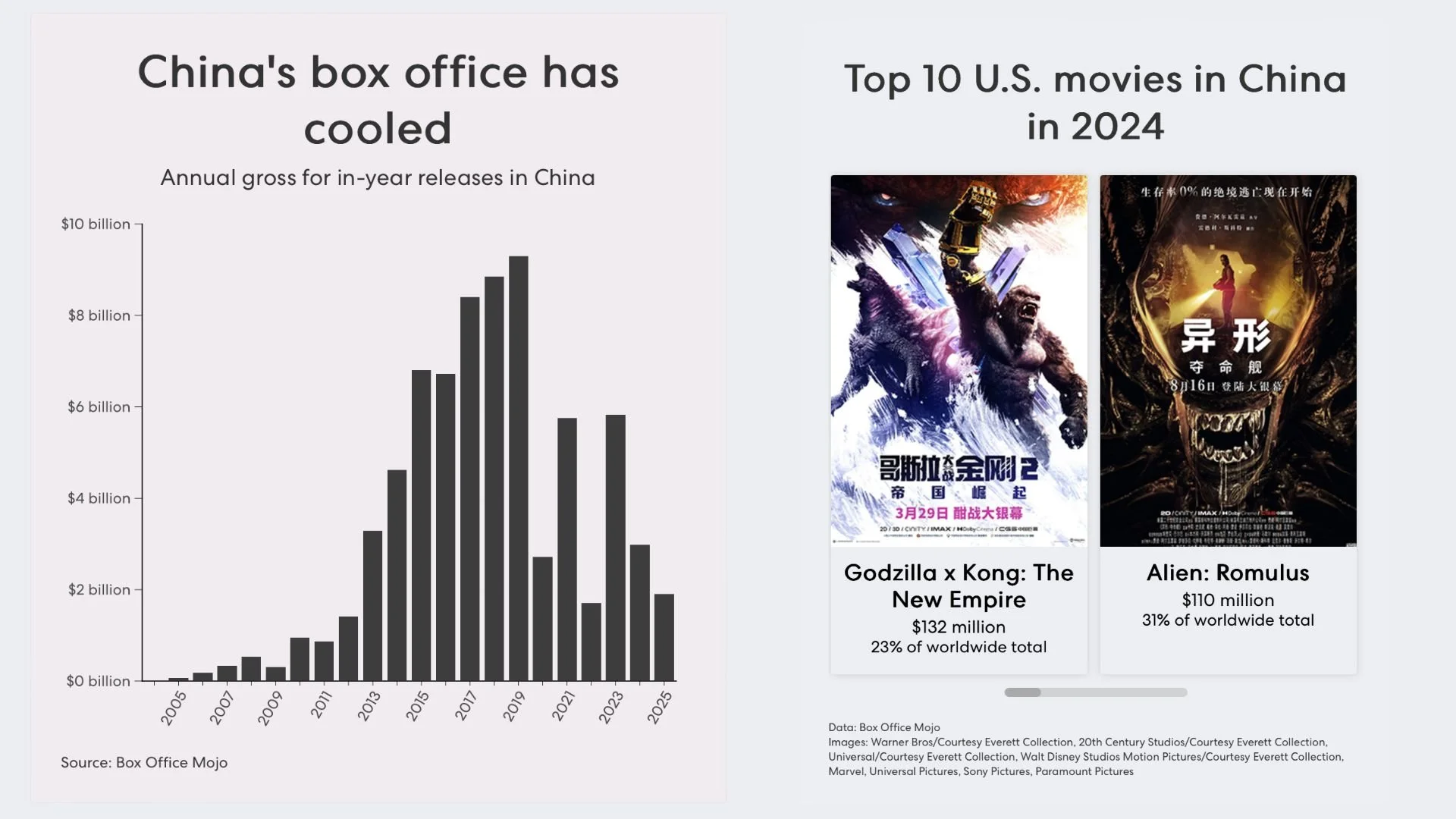How Screwed Is Hollywood Now That Trump Is Playing Chicken With China?
Ng Han Guan/Associated Press
With new tariffs and fewer U.S. films allowed in Chinese theaters, Hollywood’s global dominance faces a high-stakes plot twist.
The international box office just took a geopolitical gut punch. Earlier this week, China officially announced that it will “moderately reduce” the number of Hollywood films allowed into its theaters — a direct retaliation against President Trump’s decision to escalate tariffs on Chinese goods to a staggering 125%.
While this isn’t the full-scale ban some feared, it still marks a serious inflection point in the uneasy marriage between American film studios and the Chinese market — a partnership that, for the last two decades, has played an outsized role in determining a blockbuster’s global success or failure.
The Fallout Begins: Summer Blockbusters in Peril
The timing couldn’t be worse. Summer 2025 is loaded with studio tentpoles banking on international grosses to recoup bloated production budgets. Marvel’s Thunderbolts is slated to open in China on April 30 — or was, before this latest development put its release in jeopardy. With The Fantastic Four: First Steps dropping in July and Avengers: Doomsdayon deck for 2026, Disney’s Phase Six plans could be blindsided before they even begin.
Meanwhile, Universal’s Scarlett Johansson-led Jurassic World: Rebirth faces similar uncertainty. Past Jurassic films have performed spectacularly in China: Dominion grossed over $157M, Fallen Kingdom cleared $261M, and the 2015 reboot earned $228M. Lose those numbers, and the future of the franchise may look a lot more endangered than its dinosaurs.
And then there’s Avatar: Fire and Ash, James Cameron’s December epic that hopes to repeat the $245M haul The Way of Water earned in China. If Beijing pulls the plug on that release, Disney’s quarterly projections could implode faster than an underwater Na’vi stronghold.
China’s Cinematic Self-Reliance
Box Office Mojo
Let’s be clear: China doesn’t need Hollywood anymore. At least, not the way it used to.
This year, Ne Zha 2, a Chinese animated fantasy epic, grossed nearly $2 billion globally — without any major Western release. It’s not a one-off either. China’s domestic film industry has been systematically weaning itself off U.S. imports while nurturing local IP that resonates with national pride and populist appeal.
Chinese officials framed their new restrictions not just as an economic tactic, but a cultural one: retaliation against perceived U.S. arrogance and economic aggression. In their official statement, the China Film Administration said, “The wrong action of the U.S. government to abuse tariffs on China will inevitably further reduce the domestic audience’s favorability toward American films.”
Translation? If you raise the economic stakes, we’ll raise the cultural drawbridge.
Hollywood’s Soft Power: Diminished?
Studios have historically bent over backward to appease Chinese regulators. Transformers: Age of Extinction inexplicably included a Chinese ATM in a scene set in Texas. Entire plot points have been rewritten. Characters removed. Maps altered. But in the current climate, even capitulation might not work.
Warner Bros. Discovery CEO David Zaslav once praised Trump’s election as a “chance for consolidation.” He probably didn’t expect that consolidation to include American films being consolidated right out of foreign theaters.
For Marvel, which is already struggling to stabilize after a rocky Phase Four and Five, this could be a death blow. Without Chinese ticket sales to cushion box office returns, marginal hits become flops, and flops become billion-dollar liabilities. In a franchise-driven ecosystem where future greenlights depend on global profitability, this could mean fewer sequels, fewer experiments, and fewer chances for course correction.
A Culture War Disguised as Trade Policy
This isn’t just about movies. It’s about the United States’ diminishing cultural capital abroad. As China’s economic influence grows, so too does its appetite to control the narratives its citizens consume — and to export its own stories globally instead. If Hollywood can no longer count on China, it will need to double down on other foreign markets, deepen its appeal at home, and fundamentally rethink how it builds international box office strategy.
In short: Hollywood isn’t doomed. But it is, at the very least, moderately screwed.
THE CINEMA GROUP
YOUR PREMIER SOURCE FOR THE LATEST IN FILM AND ENTERTAINMENT NEWS










